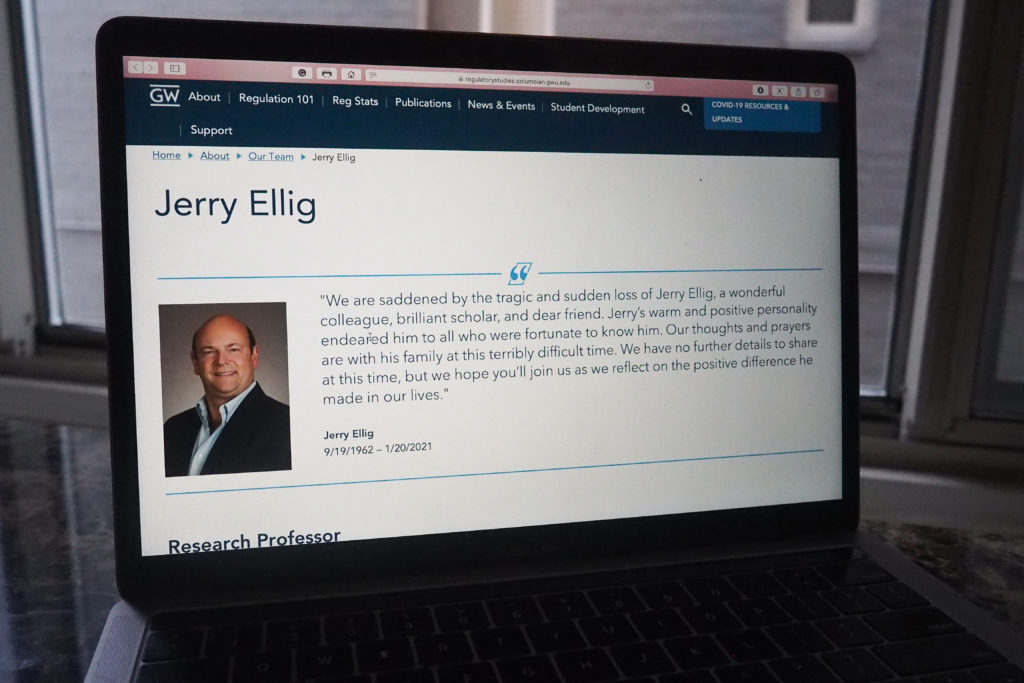Jerry Ellig, a research professor at the Regulatory Studies Center, died Jan. 20 of heart complications. He was 58.
Prior to joining GW in 2018, Ellig worked as an economist at the Federal Communications Commission and the joint economic committee of Congress. Ellig’s colleagues said they remember him as a friendly, “unpretentious” and knowledgeable scholar in the field of regulatory economics.
Ellig published articles on government regulation and management over the course of his career in scholarly and popular publication papers like the Journal of Regulatory Economics and The Washington Post, according to the RSC’s website.
Howard Beales, the former director of the Bureau of Consumer Protection at the Federal Trade Center and a senior scholar at the RSC, said he met Ellig in the late 1980s when Ellig was a professor at the Mercatus Center, a research center at George Mason University. He said Ellig was a “true academic” in his approach to public policy and always considered the best outcome for consumers in his research.
“He was always a very sharp, very insightful analyst of regulations and their effects,” Beales said. “He was a good, careful, empirical worker.”
Beales said he spent most of his time with Ellig when they both worked at the FTC, where Ellig served as the director of policy planning. He said Ellig was always friendly and had a great sense of humor.
“Jerry was a true academic in his approach to public policy,” he said. “He was always asking what’s best for consumers and what’s going to produce the best outcome for consumers. That’s what guided his analysis of proposed regulations or regulatory policies across the board. That was his motivation.”
Susan Dudley, the director of the RSC and a professor of practice in the Trachtenberg School of Public Policy and Public Administration, said Ellig was a “terrific” mentor who always collaborated with graduate students and colleagues on “serious” research that led to peer-reviewed publications in economic, public administration, political science and law journals.
“He was a great communicator, able to take his academic work and translate it for different audiences, including through seminars, op-eds, short presentations and classroom teaching,” Dudley said in an email.
She said Ellig was “brilliant” at applying economic concepts and empirical analysis in his research to improve public policy, bringing his academic tools in real policy problems and had “several stints in government agencies.”
Dudley said Ellig’s most “outstanding” quality was his personal humility and good-natured approach to work and life, despite all of his achievements.
“I never heard him indulge in gossip or negativity,” she said. “He endeared himself to people, even those who met him briefly, because he was genuinely good and kind, unpretentious and honest, considerate and laugh-out-loud funny.”
Kerry Krutilla, a professor of public policy at Indiana University Bloomington and an RSC scholar, said he met Ellig at various conferences on regulatory economics around 2013. He said he enjoyed running into Ellig at those conferences and exchanging emails on a regular basis, through which they would have conversations about regulatory benefit-cost analysis, a tool used by economists to see the financial costs and benefits of regulation.
“He was a deep expert in that area, and he was more than willing to share information with me about that, and I really enjoyed discussing it with him,” Krutilla said.
He said Ellig had a “stellar” record as one of the top regulatory economists. He said he entered the field of regulatory benefit-cost analysis later in his professional career, during which Ellig was an “ideal” colleague who helped him to learn more about the subject.
“I really appreciated his unpretentious, authentic and friendly way of communicating deep insights and knowledge,” Krutilla said. “I really liked his persona as a role model, which is an ideal way for a colleague to be.”
William Albrecht, a professor emeritus of economics at the University of Iowa and an RSC scholar, said he met Ellig in the 1990s at various economic conferences at George Mason University.
“We just kept running into each other, and he always remembered me, which I liked,” Albrecht said.
He said Ellig was a “good scholar” who had a “keen eye” for a wide range of regulatory issues from national to environmental regulation. He added that Ellig “always thought of his fellow man.”
“Sometimes economics can be kind of mean and bitter, but he was a generous man,” Albrecht said.








